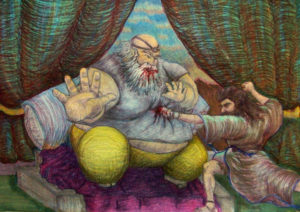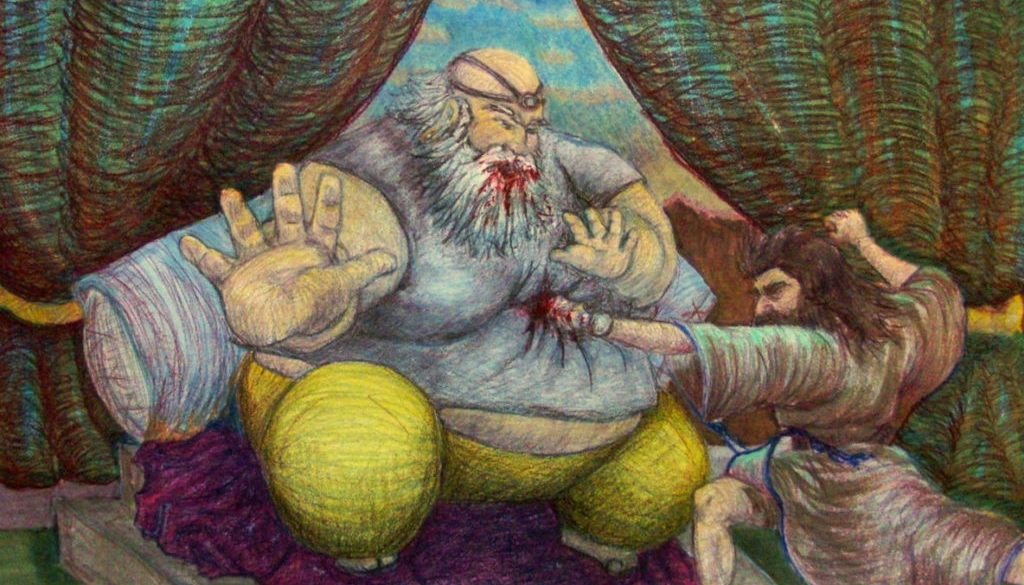Judges 3:12-30 Judge Ehud

We meet the second of Israel’s judges. God raised him up after the people went astray again. He would free them from Eglon, the king of Moab.
I’m not sure how to interpret the “rest years” for Israel. After Othniel freed Israel they had 40 years of rest but then they got back in trouble with false idols and were conquered again. So does the 40 years mean that was the amount of time between their deliverance from Cushan-rishathaim and their conquest by Eglon or that they were faithful for 40 years after their deliverance?
If you are tracking war, oppression and freedom we wouldn’t know how long Othniel lived and when Israel started down the wrong road again. If we are tracking faithfulness, judgement and deliverance we don’t know how many years are between these two judges. I have a feeling we are tracking the former as Ehud’s deliverance of Israel results in an 80 year rest from war. This would make Ehud around 100 years old by the end of that time.
The first time Israel went back into captivity it was for eight years. As I stated last time, we aren’t told if this was a wide spread conquest or a specific area only. Nor do we know what this conquest entailed. Were the Israelites made into slaves again? Were they under the rule of the other nation as they were with Rome? Was it a taxation situation, a physical oppression or a political issue? I don’t have the answers for these questions. Maybe it was all of the above.
We learn a little more about this conquest. First of all, we are told that conquest involved a consortium of peoples. The king of Moab had the Ammonites and the Amalekites help him defeat Israel. But the king of Moab was who Israel had to pay tribute to. This means that their captivity was at least a taxation situation.
We are also told that Ehud called the people from the hill country and led them in a rebellion that freed them. This to me says that the conquest was geographically confined or at most was removed under the hand of an army from that region.
This conquest lasted longer than the last one too. It took eighteen years before the people cried out to God. It could be that they were resigned to their lot in life, that this oppression was less severe than the last time or that their hearts took longer to turn back to God. Did only a few cry out earlier and God delayed until the whole people came back to Him. Did He delay in delivering them so they would appreciate it more? Or did He respond right after their first cries went up? Only He knows the answer to those questions too.
I want to take a moment and look at Ehud himself. Ehud used his natural abilities, he planned in advance, he appeared to pose no threat to anyone and he was crafty.
Ehud was from the tribe of Benjamin. The tribe of Benjamin is the only tribe that is mentioned in the bible as having left handed men and they were famous for their ability to fight left handed. I don’t know if that means they were left handed or if they trained that way to surprise their enemies. This was a special skill in battle because it threw the enemy off his game.
Before even going to see the king of Moab Ehud made himself a two edged sword. This sword could be concealed beneath his clothing. He had to make it long enough to do the job but small enough that it wouldn’t be noticed if he was searched. A close pat down would probably have revealed it but being it was on his right thigh instead of his left it went unnoticed. Ehud also made sure he was in charge of the crew of men bringing the tribute to the king of Moab.
When Ehud brought tribute to the king he had to appear as if he posed no threat to anyone. After slipping his weapon through the guards he had to act innocent. The men who came with him didn’t think twice about leaving him when he sent them on ahead. The king easily dismissed his servants when Ehud whispered that he had a secret message. He appeared harmless until the right moment.
After lulling the king into a false sense of security Ehud took action. He didn’t give a battle cry before attacking. He came in close and delivered a quiet message. “I have a message from God for you” (verse 20b). This message wasn’t one of lengthy words but on of action. Ehud quickly and quietly delivered his ‘message’ of death then calmly walked out of the room and locked the doors behind him. Ehud didn’t even try to retrieve his weapon. The force with which Ehud drove it and the fat rolls of the king hid the sword completely. “And the hilt also went in after the blade, and the fat closed over the blade” (verse 22a). Locking the doors provided Ehud with time to escape.
Ehud’s actions of locking the doors behind him played right into the king’s normal habits. The servants thought nothing of waiting while their king relieved himself in the closet of the cool chamber. It wasn’t until some time had passed before they became suspicious.
Did God give Ehud all these ideas and tactics that he used to carry out this mission? God has acted on man’s heart more than once in the stories that we read. He could have easily influenced where the king chose to hold court that day. He could have diverted the guards’ eyes when they were watching for weapons. He could have influenced any one of a hundred different actions or circumstances that gave Ehud this perfect opportunity to end Israel’s suffering that day.
But Ehud had to be willing to step up and make use of what God provided. He had to prepare in advance and be ready when God called him into action. I wonder if Ehud even prepared by finding out the kings habits before going before him that day. How long did it take for Ehud to be ready to deliver God’s deliverance that day? This was definitely NOT a rush job. Ehud and God worked out every detail before the day arrived. I wonder if Ehud was nervous at all or if he felt the calm of God’s Spirit as he walked this path.
Ehud’s work didn’t end at the death of the king. He called the people out of the hills and led them into battle after walking calmly out of the city. He was unassuming to the king but commanded great dedication from the people of Israel. They immediately followed him into battle. “Follow after me, for the Lord has given your enemies the Moabites into your hand” (verse 28b).
The battle Ehud and the Israelites from the hill country fought with God that single day was AMAZING! “They killed at that time about 10,000 Moabites, all strong, able-bodied men; not a man escaped” (verse 29). God freed them in one day and they remained free and at peace for 80 years afterwards. God’s deliverance stayed with the people for more than a generation.
To me Ehud was a little like Noah. He listened to God’s voice early on and prepared for what God called him to do. Ehud’s preparations weren’t as extensive as Noah’s but they still required him to trust that God had a plan. I don’t know if God gave Ehud all the details in advance or if His plan was revealed one step at a time but Ehud was ready to put in the work for whatever God would bring.
Father God, I want to be ready to do whatever You call me to. I pray I’m putting in the work for what lies ahead. I trust You to show me what I need to prepare beforehand and what I need to let go and let You direct as we walk along. Ehud didn’t go on his trip to the king alone. Your Spirit walked ahead of him and prepared everything in advance on the king’s end as well as walking with Ehud and giving him strength and assurance of Your promises. I want to walk in confidence like Ehud. I want to KNOW I’m walking in Your plan.
Help me see the road You have laid out for me. Don’t let me be turned from it or lured onto another. Give me patience as I wait until I’m told BY YOU to take the next step. And give me courage as I take those steps. I’m praying I haven’t already strayed off Your path for me. If I have, please forgive me and bring me back into line with where You want me to go. Thank You Lord that I can trust You with my life.



